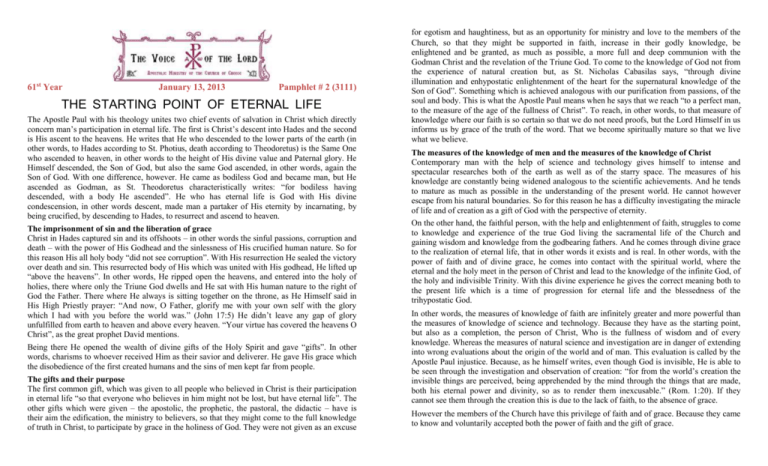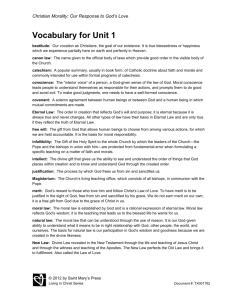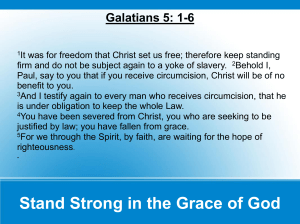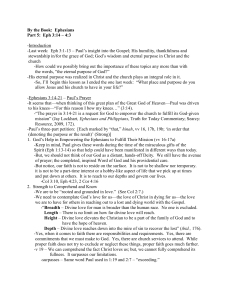61st Year January 13, 2013 Pamphlet # 2 (3111) THE STARTING
advertisement

61st Year January 13, 2013 Pamphlet # 2 (3111) THE STARTING POINT OF ETERNAL LIFE The Apostle Paul with his theology unites two chief events of salvation in Christ which directly concern man’s participation in eternal life. The first is Christ’s descent into Hades and the second is His ascent to the heavens. He writes that He who descended to the lower parts of the earth (in other words, to Hades according to St. Photius, death according to Theodoretus) is the Same One who ascended to heaven, in other words to the height of His divine value and Paternal glory. He Himself descended, the Son of God, but also the same God ascended, in other words, again the Son of God. With one difference, however. He came as bodiless God and became man, but He ascended as Godman, as St. Theodoretus characteristically writes: “for bodiless having descended, with a body He ascended”. He who has eternal life is God with His divine condescension, in other words descent, made man a partaker of His eternity by incarnating, by being crucified, by descending to Hades, to resurrect and ascend to heaven. The imprisonment of sin and the liberation of grace Christ in Hades captured sin and its offshoots – in other words the sinful passions, corruption and death – with the power of His Godhead and the sinlessness of His crucified human nature. So for this reason His all holy body “did not see corruption”. With His resurrection He sealed the victory over death and sin. This resurrected body of His which was united with His godhead, He lifted up “above the heavens”. In other words, He ripped open the heavens, and entered into the holy of holies, there where only the Triune God dwells and He sat with His human nature to the right of God the Father. There where He always is sitting together on the throne, as He Himself said in His High Priestly prayer: “And now, O Father, glorify me with your own self with the glory which I had with you before the world was.” (John 17:5) He didn’t leave any gap of glory unfulfilled from earth to heaven and above every heaven. “Your virtue has covered the heavens O Christ”, as the great prophet David mentions. Being there He opened the wealth of divine gifts of the Holy Spirit and gave “gifts”. In other words, charisms to whoever received Him as their savior and deliverer. He gave His grace which the disobedience of the first created humans and the sins of men kept far from people. The gifts and their purpose The first common gift, which was given to all people who believed in Christ is their participation in eternal life “so that everyone who believes in him might not be lost, but have eternal life”. The other gifts which were given – the apostolic, the prophetic, the pastoral, the didactic – have is their aim the edification, the ministry to believers, so that they might come to the full knowledge of truth in Christ, to participate by grace in the holiness of God. They were not given as an excuse for egotism and haughtiness, but as an opportunity for ministry and love to the members of the Church, so that they might be supported in faith, increase in their godly knowledge, be enlightened and be granted, as much as possible, a more full and deep communion with the Godman Christ and the revelation of the Triune God. To come to the knowledge of God not from the experience of natural creation but, as St. Nicholas Cabasilas says, “through divine illumination and enhypostatic enlightenment of the heart for the supernatural knowledge of the Son of God”. Something which is achieved analogous with our purification from passions, of the soul and body. This is what the Apostle Paul means when he says that we reach “to a perfect man, to the measure of the age of the fullness of Christ”. To reach, in other words, to that measure of knowledge where our faith is so certain so that we do not need proofs, but the Lord Himself in us informs us by grace of the truth of the word. That we become spiritually mature so that we live what we believe. The measures of the knowledge of men and the measures of the knowledge of Christ Contemporary man with the help of science and technology gives himself to intense and spectacular researches both of the earth as well as of the starry space. The measures of his knowledge are constantly being widened analogous to the scientific achievements. And he tends to mature as much as possible in the understanding of the present world. He cannot however escape from his natural boundaries. So for this reason he has a difficulty investigating the miracle of life and of creation as a gift of God with the perspective of eternity. On the other hand, the faithful person, with the help and enlightenment of faith, struggles to come to knowledge and experience of the true God living the sacramental life of the Church and gaining wisdom and knowledge from the godbearing fathers. And he comes through divine grace to the realization of eternal life, that in other words it exists and is real. In other words, with the power of faith and of divine grace, he comes into contact with the spiritual world, where the eternal and the holy meet in the person of Christ and lead to the knowledge of the infinite God, of the holy and indivisible Trinity. With this divine experience he gives the correct meaning both to the present life which is a time of progression for eternal life and the blessedness of the trihypostatic God. In other words, the measures of knowledge of faith are infinitely greater and more powerful than the measures of knowledge of science and technology. Because they have as the starting point, but also as a completion, the person of Christ, Who is the fullness of wisdom and of every knowledge. Whereas the measures of natural science and investigation are in danger of extending into wrong evaluations about the origin of the world and of man. This evaluation is called by the Apostle Paul injustice. Because, as he himself writes, even though God is invisible, He is able to be seen through the investigation and observation of creation: “for from the world’s creation the invisible things are perceived, being apprehended by the mind through the things that are made, both his eternal power and divinity, so as to render them inexcusable.” (Rom. 1:20). If they cannot see them through the creation this is due to the lack of faith, to the absence of grace. However the members of the Church have this privilege of faith and of grace. Because they came to know and voluntarily accepted both the power of faith and the gift of grace. Archimandrite P. K. 61st Year Translated by Presbyter Nicholas Palis January 13, 2013 Pamphlet # 2 (3111) THE STARTING POINT OF ETERNAL LIFE The Apostle Paul with his theology unites two chief events of salvation in Christ which directly concern man’s participation in eternal life. The first is Christ’s descent into Hades and the second is His ascent to the heavens. He writes that He who descended to the lower parts of the earth (in other words, to Hades according to St. Photius, death according to Theodoretus) is the Same One who ascended to heaven, in other words to the height of His divine value and Paternal glory. He Himself descended, the Son of God, but also the same God ascended, in other words, again the Son of God. With one difference, however. He came as bodiless God and became man, but He ascended as Godman, as St. Theodoretus characteristically writes: “for bodiless having descended, with a body He ascended”. He who has eternal life is God with His divine condescension, in other words descent, made man a partaker of His eternity by incarnating, by being crucified, by descending to Hades, to resurrect and ascend to heaven. The imprisonment of sin and the liberation of grace Christ in Hades captured sin and its offshoots – in other words the sinful passions, corruption and death – with the power of His Godhead and the sinlessness of His crucified human nature. So for this reason His all holy body “did not see corruption”. With His resurrection He sealed the victory over death and sin. This resurrected body of His which was united with His godhead, He lifted up “above the heavens”. In other words, He ripped open the heavens, and entered into the holy of holies, there where only the Triune God dwells and He sat with His human nature to the right of God the Father. There where He always is sitting together on the throne, as He Himself said in His High Priestly prayer: “And now, O Father, glorify me with your own self with the glory which I had with you before the world was.” (John 17:5) He didn’t leave any gap of glory unfulfilled from earth to heaven and above every heaven. “Your virtue has covered the heavens O Christ”, as the great prophet David mentions. Being there He opened the wealth of divine gifts of the Holy Spirit and gave “gifts”. In other words, charisms to whoever received Him as their savior and deliverer. He gave His grace which the disobedience of the first created humans and the sins of men kept far from people. The gifts and their purpose The first common gift, which was given to all people who believed in Christ is their participation in eternal life “so that everyone who believes in him might not be lost, but have eternal life”. The other gifts which were given – the apostolic, the prophetic, the pastoral, the didactic – have is their aim the edification, the ministry to believers, so that they might come to the full knowledge of truth in Christ, to participate by grace in the holiness of God. They were not given as an excuse for egotism and haughtiness, but as an opportunity for ministry and love to the members of the Church, so that they might be supported in faith, increase in their godly knowledge, be enlightened and be granted, as much as possible, a more full and deep communion with the Godman Christ and the revelation of the Triune God. To come to the knowledge of God not from the experience of natural creation but, as St. Nicholas Cabasilas says, “through divine illumination and enhypostatic enlightenment of the heart for the supernatural knowledge of the Son of God”. Something which is achieved analogous with our purification from passions, of the soul and body. This is what the Apostle Paul means when he says that we reach “to a perfect man, to the measure of the age of the fullness of Christ”. To reach, in other words, to that measure of knowledge where our faith is so certain so that we do not need proofs, but the Lord Himself in us informs us by grace of the truth of the word. That we become spiritually mature so that we live what we believe. The measures of the knowledge of men and the measures of the knowledge of Christ Contemporary man with the help of science and technology gives himself to intense and spectacular researches both of the earth as well as of the starry space. The measures of his knowledge are constantly being widened analogous to the scientific achievements. And he tends to mature as much as possible in the understanding of the present world. He cannot however escape from his natural boundaries. So for this reason he has a difficulty investigating the miracle of life and of creation as a gift of God with the perspective of eternity. On the other hand, the faithful person, with the help and enlightenment of faith, struggles to come to knowledge and experience of the true God living the sacramental life of the Church and gaining wisdom and knowledge from the godbearing fathers. And he comes through divine grace to the realization of eternal life, that in other words it exists and is real. In other words, with the power of faith and of divine grace, he comes into contact with the spiritual world, where the eternal and the holy meet in the person of Christ and lead to the knowledge of the infinite God, of the holy and indivisible Trinity. With this divine experience he gives the correct meaning both to the present life which is a time of progression for eternal life and the blessedness of the trihypostatic God. In other words, the measures of knowledge of faith are infinitely greater and more powerful than the measures of knowledge of science and technology. Because they have as the starting point, but also as a completion, the person of Christ, Who is the fullness of wisdom and of every knowledge. Whereas the measures of natural science and investigation are in danger of extending into wrong evaluations about the origin of the world and of man. This evaluation is called by the Apostle Paul injustice. Because, as he himself writes, even though God is invisible, He is able to be seen through the investigation and observation of creation: “for from the world’s creation the invisible things are perceived, being apprehended by the mind through the things that are made, both his eternal power and divinity, so as to render them inexcusable.” (Rom. 1:20). If they cannot see them through the creation this is due to the lack of faith, to the absence of grace. However the members of the Church have this privilege of faith and of grace. Because they came to know and voluntarily accepted both the power of faith and the gift of grace. Archimandrite P. K. Translated by Presbyter Nicholas Palis









